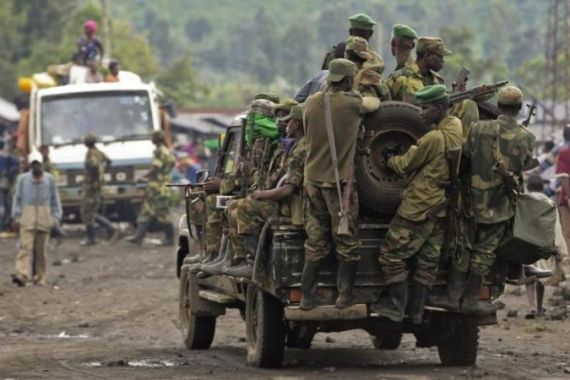DR Congo army returns to Goma
M23 rebels warn to retake the city, if the government fails to enter negotiations.

DR Congo troops have entered the eastern mining city of Goma, two days after rebel M23 fighters withdrew in line with a regionally brokered deal.
But the rebels said they would retake the city, if the government failed to meet their demands within 48 hours.
The rebels’ lightning capture of Goma on November 20 eight months after they launched an uprising against Kinshasa had sparked fears of a wider war and major humanitarian crisis, and their withdrawal was widely welcomed.
Dozens of government army trucks, crammed with heavily armed soldiers, entered the regional capital in the afternoon, after trundling along the shores of Lake Kivu.
A battalion of around 600 men in total is expected to move into Goma, while government officials have also begun to arrive back to reassert their authority after 12-days of rebel rule.
While the M23 fighters have left the city, rebels remained camped just beyond the outskirts, appearing to break a deal to pull back 20 kilometres from Goma, with residents fearing renewed clashes as the two sides edge closer.
“Our people are still there because you can only withdraw in stages, that is how it is done,” said rebel commander Antoine Manzi.
Ugandan army chief Aronda Nyakairima, speaking after a meeting in Goma with army chiefs of DR Congo and Rwanda, said he was “completely satisfied with the implementation of the accord so far” and that the rebels would fully pullback.
DR Congo’s interior minister, Richard Muyej Mangez, said the government was ready to start talks “in the next few days”, but that M23 should respect the agreement to withdraw the full 20 kilometres.
Uganda will mediate the talks, which will begin once a full withdrawal has taken place.
The region, which borders Rwanda and Uganda, has been the cradle of back-to-back wars that embroiled other nations from 1996 to 2003 and were fought largely over its vast wealth of copper, diamonds, gold and coltan.
Neighbours’ role
Meanwhile, UN experts have accused Rwanda and Uganda, which played active roles in DR Congo’s previous wars, of supporting M23, a charge both countries deny.
The group of experts quotes local people as saying more than 1,000 Rwandan troops crossed into DR Congo before the offensive and that Rwandan generals helped M23 commander Sultani Makenga lead the attack.
The day Goma was captured, some 500 Rwandan soldiers crossed into the city from the Rwandan town of Gisenyi, to back up the rebel forces, the report quotes various Congolese and Rwandan sources as saying.
The report includes photos of several people it identifies as Rwandan troops on Congolese territory.
M23 was founded by former fighters in a Tutsi rebel group whose members were integrated into the regular army under a 2009 peace deal that they claim was never fully implemented.
Aid agencies are struggling to cope with the newly displaced, with some 285,000 people having fled their homes since the rebels began their uprising in April.